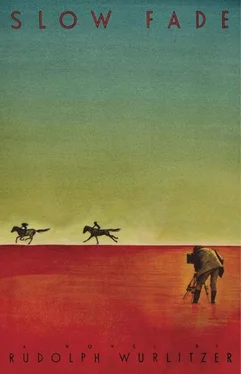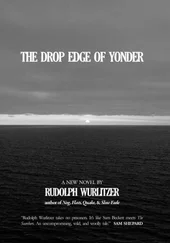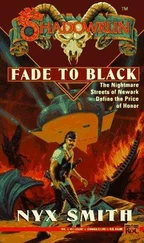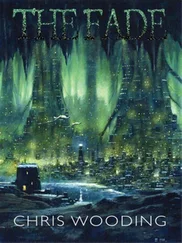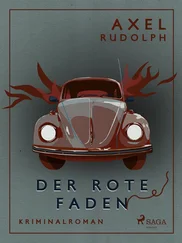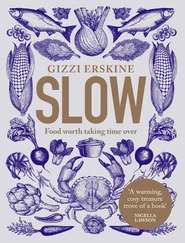Rudolph Wurlitzer
Slow Fade
Slow Fade Revisited by Alex Cox
THE RETURN OF Slow Fade is a fine thing. It’s Rudy Wurlitzer’s greatest work of fiction, both as a novel and as a screenplay, and one of the best American books there is. I’ll get to the screenplay in a moment. Slow Fade the book is based on Wurlitzer’s personal experiences with noted film director Sam Peckinpah, and also with the American Sixties dharma trip in India and elsewhere. Either subject would have been a fine basis for a novel. Only Rudy’s restless mind could make one story of both, merging two seemingly disparate things into one mad world — one compact, entertaining, edgy, tragic, epic narrative.
One of the underlying themes of Rudy’s Westerns — Pat Garrett & Billy the Kid, Walker , and the unfilmed Zebulon — is men who became famous heroes by dragging other, less famous men to their deaths. Pat Garrett and Billy are responsible for at least a score of killings in Rudy’s screenplay: shooting deaths that were unnecessary, that could have been avoided, had the protagonists not been so vainglorious. William Walker is even more lethally heroic. The “gray-eyed man of destiny” has a body count in the thousands (not including cholera). And the relentless Captain pursues Zebulon, the mountain man, no matter how great the collateral damage.
So Slow Fade ’s Wesley Hardin drives his family to its doom. Unable to direct pictures, the old director decides to direct people and events instead, and a fragile, messed-up family situation takes on new dimensions of demented drama. Wesley Hardin’s complex family wasn’t Peckinpah’s; it is Rudy’s invention, and the two men’s careers are notably different. Hardin has directed thirty or forty films in many genres and made a substantial fortune. Peckinpah made a dozen features and lived in a trailer. Yet the character of Hardin is utterly, entirely Peckinpah. Wracked by all manner of ailments and addicted to cocaine, alcohol, and controlling others, Peckinpah was the greatest director of Westerns since John Ford: a contradictory, brilliantly talented, sometimes terrifying man. Rudy wrote Pat Garrett for Monte Hellman to direct, but the studio gave it to Peckinpah, the Western guy, instead. He gutted the script, turning it from a lonesome, existential tale whose heroes didn’t meet until the very end into a story of old buddies who betray each other’s code. The screenwriter didn’t necessarily appreciate the process, but what the director was doing was transforming Wurlitzer’s script into a Peckinpah film. Almost all Peckinpah’s films, and all his Westerns, were about old friends betraying each other’s code, and by God, Pat Garrett & Billy the Kid would be, too.
The chapter where Wesley, fired up by a silver bullet full of coke, decides to shoot an unscheduled scene involving Pancho Villa in the middle of the night, knowing it will get him fired and the film shut down, which it does, is a vintage Peckinpah moment. Yet Rudy combines all of this very specific Western madness with something which one might naively associate with serenity: the “mystic East.” His own trajectory had taken him on travels such as these, and so, just as he drew Wesley from life, he writes about the crowded, hectic, disorderly, incoherent world of the dharma bums with some authority. That world, too, of young Americans and Europeans seeking to find spiritual authenticity or just get away from their parents was one Rudy once inhabited, or transited.
Slow Fade is not a long book, and it is a pleasure to read, but it is by no means “light.” It moves, inexorably, from continent to continent, like a 747, low on fuel, whose undercarriage won’t come down. Disaster looms. And the one character who, if there were any justice, should pay the penalty for this wrecked, calamitous set of circumstances, doesn’t. Wesley Harding just keeps on tickin’. Like Rudy’s Western heroes, he is built of devilishly epic stuff.
Walker, Wesley’s son, provides the story-within-the-story of Slow Fade , a narrative of what has happened to his missing sister, Clementine, written for his perverse father in the form of a screenplay. Rudy wrote the book in 1982–3, I think. It was first published in 1984. It has such great characters and scenes that several directors encouraged him to write a screenplay based on it. (I was one of those directors.) He wrote the Walker screenplay in 1986, and we shot that film in Nicaragua in 1987. So I’d guess Rudy wrote Slow Fade , the screenplay, in 1988.
We wrote some other scripts during that period, together and apart. One was about the trade in infant body parts, and one about the contra war, but none of them, and nothing else, came close to Rudy’s screenplay based on the novel Slow Fade . It is one of the best scripts I have ever read, incredibly disciplined in all its choices. The characters it cut, the locations and scenes lost from the book — all its choices were the right ones.
For starters, Rudy took the pages Walker wrote for his father and made them the set-up. The character of A.D. disappeared, becoming incorporated into Walker (as the screenplay son was now known) and giving him more of a desperado quality. Jim became Walker again, luckily. The annoying cameraman Sidney became an even more obnoxious limey documentary producer who wants to make Wesley’s life into a reality TV show. Prescient or what? In the screenplay of Slow Fade , the action moves from Beverly Hills to Monument Valley (where Wesley’s last Western is being filmed) to India. It is mesmeric and seamless, and it retains the book’s most marvelous scene, where the young travelers are snake-poisoned and robbed aboard their luxury train compartment. The biggest surprise of the screenplay, for those who have experienced the book, is the self-involved director’s decision not to go to Labrador, but to follow his wife and children to India. This provokes a cataclysm, like all acts of well-intentioned colonialism. And in India, beside twin funeral pyres, the screenplay ends.
Rudy and I worked with a top producer, Lorenzo O’Brien, to try and get Slow Fade the movie on. But the obstacles overwhelmed us. The script was a downer, it was set in India, and characters got killed. (Movie stars don’t like to die.) No one would make a film with the commies who made Walker . One day Rudy ran into a Thai prince and, like a master chef, whipped up a Slow Fade set in Thailand. But the Indian version was the killer, the one we all three wanted to exhaust ourselves on and lose our shirts on once again. The script was that good.
The film of Slow Fade has yet to be made. As Joe Strummer observed, the future is not yet written. In the meantime, here’s the original, with a broader canvas than the script, more characters, and more locations, written when the old scribbler was just getting into his stride.
“You’re A.D., right? The doctor or shrink who’s taking care of Walker.”
Sure I am. . And now it’s time to meet the prototypical, disposable, identity-shifting Wurlitzer hero: musician, road manager, doctor, Hollywood producer, screenwriter, Mr. A.D. Ballou.
Alex Cox , Southern Oregon, April 2, 2011
THE PHONE woke him.
“A.D.,” the voice said. “What twisted little cul-de-sac do I find you in now? It took my secretary an entire week to track you down.”
“Uptown someplace. I don’t know. Should I know?”
It was Arthur somebody. New-age impresario. Record producer. Asshole.
“Are you open for business?” Arthur asked. “I need a road manager.”
Читать дальше
